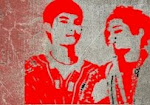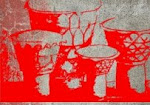Rhyan Casiño:
Finding the Music
Some musicians like to say that you don't choose your instrument: your instrument chooses you.
This certainly explains Rhyan Casino's musical path. As a university student, he longed to master the guitar, played bass in a band, and even look Classical Guitar lessons. Eventually, however, he concluded that "the instrument (was) just not for me". It wasn't until he saw the Talaandig tribal hand drum for the first time (or perhaps, until the drum saw him) that everything finally clicked. "I began playing it (but) friends thought that had been playing it for (some) time....
It just felt so natural to me."
This was just the first step on a musical journey that would go on to cover more ground - literally - than Casino could have anticipated. "I went to the mountains of Bukidnon and became friends with the Talaandig artists... I really felt that I belonged."
Soon, he became part of a tribal band, "the only non - Talaandig member of the group." From 2001 to 2005, the band created "beautiful world music" by weaving together the tribe's traditional percussions and |the western paradigm." They toured Mindanao and the Visayas, and even recorded an album, before finally disbanding.
A year later, Casino became the only non - Manobo member of a Matigsalug tribal band. This time, he learned to blend "young tunes" with traditional chants and the tone of the kudlong (two-stringed guitar). Yet, after another year of many concerts, the members went their separate ways.
Indigenous music continued to draw the urban-born Casino, and in 2007 it led him all the way to San Fernando, Bukidnon, "the hinterland of the Tigwahanon people," where he found a new gig playing "unadulterated" tribal music. It was also here that he met Datu Nilo Gabao, one of the most significant figures in his life. "He adopted me (into) his family, and we formed a band with his wife Bae Norita." The band called itself Indakulon, the Tigwahanon word for "to grow".
Ironically, it was settling with the Tigwahanon that helped Casino realize that his deram to share indigenous music encompassed more than a single tribal tradition - or a single indigenous art. This dream led to the formal organization of the Dire Husi Tribal Band early in 2009.
Dire is the Visayan word for "here", while "husi" is the Manobo word for "friend." Together they are a perfect combination for an eclectic group of "young indigenous talents...from different background - an Umayam tribe, a Higaonon tribe, (and a) Manobo tribe - coming together to create a Mindanao sound, infused with a bit of Western discipline." Casino describes their sound as "enthralling and upbeat world music."
Yet what really makes the Dire Husi Tribal Band stand out is its members' dual talents as musicians and as "craftsmen and visual artists." Hoping to popularize traditional chants and crafts among urban Filipinos, they are beginning with guerrilla marketing. "(This) May 25", for instance, "we will be doing a campus run (of) high end universities (in) Metro Manila...
It is an endeavor cultural at heart and national in vision, and Casino and his band hope to reach even urban music lovers and fashionistas. Likely drawing on his experience as a member of a band and of a tribe, Casino concludes, "many hands can do great things."
a feature of
FULLY BOOKED magazine
Issue NO.7 Vol 6
June-July 2009







No comments:
Post a Comment